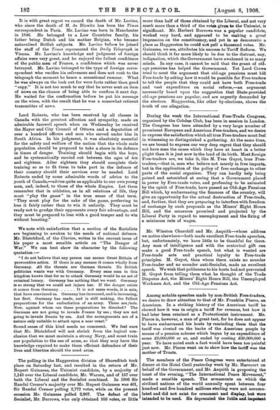The polling in the Haggerston division of Shoreditch took place
on Saturday last, and resulted in the return of Mr. Rupert Guinness, the Unionist candidate, by a majority of 1,143 over the Liberal candidate, Mr. Warren, and of 157 over both the Liberal and the Socialist combined. In 1906 Sir Randal Cremer's majority over Mr. Rupert Guinness was 401, Sir Randal Cremer polling 2,772 votes, while on the present occasion Mr. Guinness polled 2,867. The defeat of the Socialist, Mr. Burrows, who only obtained 986 votes, or little more than half of those obtained by the Liberal, and not very much more than a third of the votes given to the Unionist, is significant. Mr. Herbert Burrows was a popular candidate, worked very hard, and appeared to be making a great impression on the constituency, and yet in so democratic a place as Haggerston he could not poll a thousand votes. Mr. Guinness, we see, attributes his success to Tariff Reform. We should think it far more likely to be due to the distrust, nay, indignation, which the Government have awakened in so many minds. In any case, it cannot be said that the grant of old. age pensions has helped the Government. Yet Lord Crewe tried to meet the argument that old-age pensions must kill Free-trade by asking how it would be possible for Free-traders to tell the people that they could not have both Free-trade and vast expenditure on social reform,—an argument necessarily based upon the suggestion that State-provided old-age pensions are popular, and are urgently demanded by the electors. Haggerston, like other by-elections, shows the truth of our allegation.


































 Previous page
Previous page